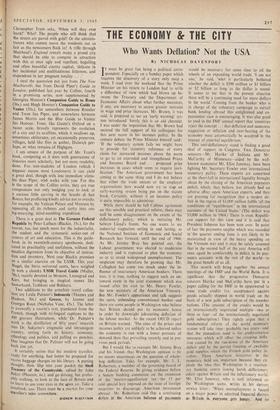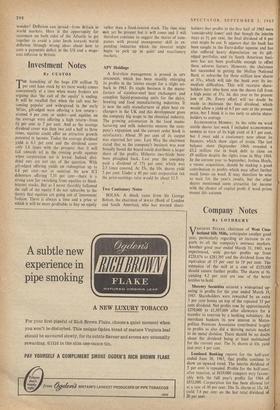THE ECONOMY & THE CITY
Who Wants Deflation? Not the USA
By NICHOLAS DAVENPORT TT must be great fun being a political corre- jspondent..Especially on a Sunday paper which requires the discovery of a story only once a week. I read over the weekend that the Prime Minister on his return to London had to settle a difference of view which had blown up be- tween the Treasury and the Department of Economic Affairs about what further measures, if any, are necessary to secure greater restraint in wage and price increases. Mr. Brown, it was said, is prepared to see an 'early warning' sys- tem introduced. Surely this is an old chestnut. I was under the impression that Mr. Brown had secured the full support of his colleagues for this next move in his incomes policy. In the censure debate the Prime Minister himself said: 'If the voluntary system fails we might have to provide for statutory reference of every claim for increased incomes above the norm to go to an expanded and strengthened Prices and Incomes Board and . . proposed price increases in cases which seem to require justi- fication.' The American government has been aiming at the same thing and I do not believe that either the trade unions or the employer organisations here would now try to stop an early-warning system being put on the statute book. Certainly, without it 'an incomes policy
is quite impossible to administer. .
While there should be full Cabinet agreement on this sensible and practical reform, there may well be some disagreement on the extent of the deflationary policy, which is imitating Mr. Selwyn Lloyd's freeze. No one wants• to see industrial stagnation setting in and lasting, as the National Institute of Economic and Social Research has forecast, until the end of 1966. As Mr. Jeremy Bray has pointed out, the Labour government was elected to modernise industry and is expected to plan the economy so as to avoid widespread unemployment. The suspicion may therefore be growing that Mr. Callaghan has come too much under the in- fluence of reactionary American bankers. There was, it is true, nothing to suggest such an un- toward event in the joint statement which was issued after his visit to Mr. Henry Fowler, the new secretary of the American Treasury. But Mr. Fowler's appearUnce and talk suggests the stern, unbending conventional banker and there are some people in Washington who believe that Britain should put its economic house in order by downright job-cutting deflation of the labour market. As the recent OECD report on Britain warned: 'The aims of the prices and incomes policy are unlikely to be achieved unless the economy is run with a lower pressure of demand than that prevailing recently and in pre- vious peak periods.'
But I would like to,reassure Mr. Jeremy Bray and his friends that Washington opinion is by no means unanimous on the question of whole- hog deflation. Take, for example, Mr. J. L. Robertson, a member of the governing board of the Federal Reserve. In giving evidence before a Senate banking committee on the extension of the 'interest-equalisation' tax—the 15 per cent special levy imposed on the issue of foreign securities to discourage American investment abroad Mr. Robertson said that a continuing deficit in the American balance of payments
would be necessary for some time to oil the wheels of an expanding world trade. '1 am not one,' he said, 'who is particularly bothered whether the deficit is $500 million or $1 billion or $2 billion as long as the dollar is sound. It seems to me that in the present situation there will be a continuing need for more dollars in the world.' Coming from the banker who is in charge of the voluntary campaign to curtail bank lending abroad this enlightened and ex- pansionist view is encouraging. It was also good to read in the IMF annual report that 'countries reject the concept ... that deflation and economic stagnation or inflation and over-heating of the economy must automatically be accepted in the interest of external equilibrium.'
This anti-deflationary stand is finding a good deal of support in Congress. Two Democrat senators--Mr. Hartke of Indiana and Mr. McCarthy of Minnesota—aided by the well- known economist Mr. Eliot Janeway, have been fighting Mr. Secretary Fowler over international monetary policy. These experts are concerned at the short-fall in international liquidity brought about by the closing of the American payments deficit, which, they believe, has already had art adverse effect upon American exports, and they are pressing for recognition that a modest de- ficit in the region of $1,000 million fulfils 'all the conditions of "equilibrium" in the international accounts of the United States.' (The deficit was $3,000 million in-1964.) There is even Republi- can support for this view and it is said that President Johnson has been won over. In point of fact the payments surplus which was recorded in' the quarter ending June is not likely to be maintained in view of the heavy spending on the Vietnam war and it may be safely assumed that in the second half of the year America will once again be comfortably in deficit in its pay- ments accounts with the rest of the world—to the great benefit of us all.
This month will bring together the annual meetings of the IMF and the World Bank. It is significant that the progressive Democrat senators Hartke and McCarthy have put in a paper calling for the IMF to be eMpowered to issue trade credits (i.e. acceptances) against goods actually shipped in world .trade on the basis of a new gold subscription of the member nations. (The amount of the credits would be an internationally negotiated multiple—two or three or four - of the internationally negotiated gold subscription.) They rightly argue that a fundamental reform of the world monetary system will take time probably two years—and that the immediate need is for credit-creation measures which will offset the creeping defla- tion caused by the run-down of the American deficit and by the partial freezing of available gold supplies which the French gold policy in- volves. These American initiatives in the monetary field are important because they ex- plode the idea that Washington is a reaction- ary banking centre issuing harsh deflationary edicts against Britain and the inflationary world. Mr. Eliot Janeway, who is well informed on the Washington scene, writes in his current service letter: 'When unemployment is forced on a major power in admitted financial distress as Britain is, everyone gets jumpy.' And no
wonder! Deflation can spread—from Britain to world markets. Here is the opportunity for statesmen on both sides of the Atlantic to get together to avoid a joint lurch towards world deflation through wrong ideas about how to cure a payments deficit in the US and a wage- cost inflation in Britain.































 Previous page
Previous page